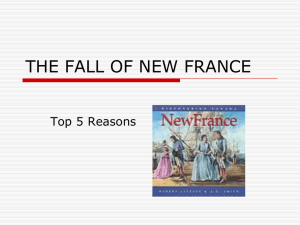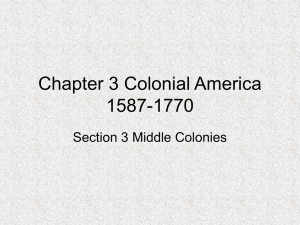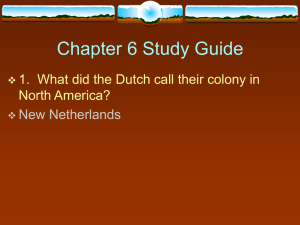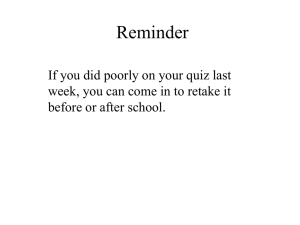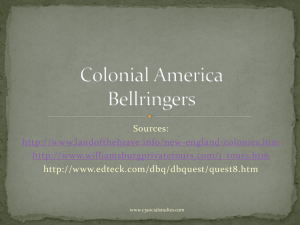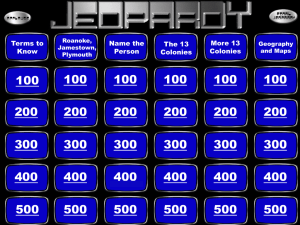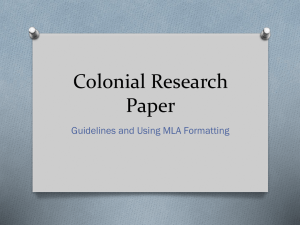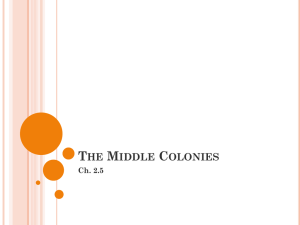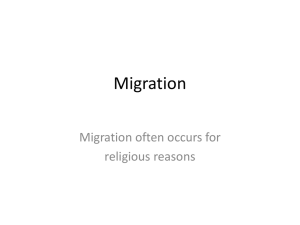Middle Colonies Notes
advertisement
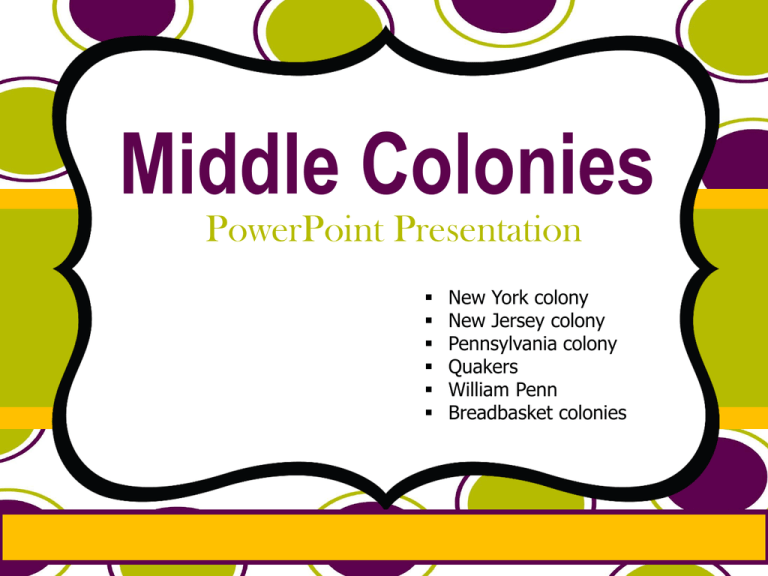
Middle Colonies PowerPoint Presentation New York colony New Jersey colony Pennsylvania colony Quakers William Penn Breadbasket colonies Colonizing North America Unit The Middle Colonies - PowerPoint Presentation #6 VOCABULARY Quakers – William Penn – Cash crops – Breadbasket Colonies – Why did William Penn start a colony in North America? Why were the Middle Colonies known as the Breadbasket Colonies? William Penn And the story continues . . . . . The Dutch and French set up trading forts in North America. Their “gold” is fur! The first successful English colony, Jamestown is established in Virginia. They begin growing tobacco. Separatists (Pilgrims) arrive in Plymouth, Massachusetts and establish the second English colony. The Puritans leave England and settle in Massachusetts Bay. Their strict way of life causes many colonists to leave thus forming new colonies in Rhode Island and Connecticut. Anne Hutchinson is forced to leave Massachusetts Bay Colony and seeks religious freedom in Rhode Island. New Hampshire is made a colony due to the northern growth of the colony of Massachusetts Bay. In Class Note-Taking Colony Name/ Founder Reason for being Founded Government And/or Religious Beliefs Main Resources Major Ports and Cities Other Important Information New York Colony Listen carefully throughout the PowerPoint discussion and correctly place the information into the Graphic Organizer about New York colony. To understand New York we must first remember New Netherland! Lets Review! In the 1600’s when European explorers were looking for a Northwest Passage, the Dutch were among them. They wanted to make money (a profit) from the Americas too! In 1626, Peter Minuit led a group of Dutch settlers to the mouth of the Hudson River. There he bought Manhattan Island from local Indians. He called his settlement New Amsterdam. 1660-s New Amsterdam grew into a busy port. The Dutch welcomed people of many nations and religions to their colony. Minuit called his entire colony New Netherland. New Amsterdam (aka: Manhattan) was a settlement in New Netherland. Hmmm. Where’s the skyscrapers? By 1664, the rivalry (competition) between the English and the Dutch was growing fierce. In August of that year, English warships entered New Amsterdam’s harbor. Peter Stuyvesant, the governor of New Netherlands swore to defend the city. : Stuyvesant had hardly any weapons and little gun powder. : the colonists wouldn’t help him fight the English because he had been an awful governor! He had imposed heavy taxes and harsh rule. Peter Stuyvesant In the end, Peter Stuyvesant surrendered without firing a shot. New Netherland was taken from the Dutch and now belonged to the English! King Charles II of England then gave New Netherland to his brother, the Duke of York. The King of England then renamed the colony NEW YORK in the Duke’s honor. The colony was governed as a Royal colony, which meant a governor and council of men was appointed (chosen) by the King of England. New York also had a representative assembly (a group of men) elected by the colonists. New York colony did not have a specific religion like the Puritans in Massachusetts Bay, instead it gave its citizens religious freedom. New York’s main city was Albany. Being a “Breadbasket Colony”, New York produced lots of grains! And also, iron, lumber, rum and cattle. Colony Name/ Founder New York Colony Kings Representative Reason for being Founded It was taken from the Dutch by the English because of its key location and ports. Government And/or Religious Beliefs Royal Colony Ruled by the King of England. Main Resources Grain Iron Rum Lumber Cattle Major Ports and Cities Albany Other Important Information New York used to be New Netherlands and was a Dutch colony until the English invaded and took it over. Colonists elect a representative assembly. Religious freedom Lets stop here for a moment and make sure you have all the important information written down in the correct places. In Class Note-Taking Colony Name/ Founder Reason for being Founded Government And/or Religious Beliefs Main Resources Major Ports and Cities Other Important Information New Jersey Colony Listen carefully throughout the PowerPoint discussion and correctly place the information into the Graphic Organizer about New Jersey colony. New Jersey The Duke of York realized that New York was too large to govern. So he gave some of the land of New York to his friends, Lord Berkeley and Sir George Carteret. Berkeley and Carteret set up a proprietary colony and called it New Jersey. A proprietary colony is where land is given to one or more people who divide the land and rent it to others. The proprietors (Berkeley and Carteret) made laws for the colony. Sir George Carteret Sir John Berkeley Religious Freedom brings many colonists to New Jersey New Jersey and New York both attracted many types of people because they allowed religious freedom. So Puritans mingled with French Protestants, Scots, Irish, Swedes and Finns. In 1702 New Jersey became a royal colony and was no longer under the control of its proprietors. New Jersey came under the control of the English King. But the colony continued to have religious freedom and their elected assembly of men that voted on local matters. New Jersey colony’s largest city was Perth Amboy. New Jersey colony produced Iron and cattle. Colony Name/ Founder New Jersey Colony Friends of Duke of York: Sir George Carteret and Sir John Berkeley Reason for being Founded New York was too large to govern so it was broken up into two sections. East Jersey and West Jersey. Government And/or Religious Beliefs A Proprietary government where Berkeley and Carteret created laws under English rights. 1702 became a royal colony but kept religious freedom and representative assembly. Main Resources Iron Cattle Major Ports and Cities Other Important Information Perth Amboy Lets stop here for a moment and make sure you have all the important information written down in the correct places. In Class Note-Taking Colony Name/ Founder Reason for being Founded Government And/or Religious Beliefs Main Resources Major Ports and Cities Other Important Information Pennsylvania Colony Listen carefully throughout the PowerPoint discussion and correctly place the information into the Graphic Organizer about Pennsylvania colony. South of New Jersey, William Penn founded the colony of Pennsylvania in 1682. Penn came from a wealthy English family. King Charles II was a personal friend. At age 22, however, Penn shocked family and friends by joining the Quakers, one of the most despised (hated) religious groups in England. William Penn What do Quakers Believe? Quaker woman preaching to crowd. Like Pilgrims and Puritans, Quakers wanted to make changes to the Church of England. Their reforms went further than those of other groups. Quakers believed that all people – men and women, nobles and commoners – were equal in God’s sight. They allowed women to preach in public and refused to bow or remove their hats in the presence of nobility. Quakers spoke out against war and refused to serve in the army. • To most English people, Quaker beliefs seemed • In both England and New England, Quakers were arrested, fined or even hanged for their ideas. • Penn became convinced that the Quakers must leave England. He turned to the king of England for help. Quakers led to execution. King Charles II made Penn proprietor (land owner) of a large tract of land in North America. The king named the new colony Pennsylvania, or “Penn’s woodlands”. A safe place for Quakers to live The King of England gives Penn land in North America. King Charles II William Penn Penn thought of his colony as a “holy experiment.” He wanted it to be a model of religious freedom, peace, and Christian living. Protestants, Catholics, and Jews went to Pennsylvania to escape persecution. Later officials forced Penn to turn away Catholics and Jewish settlers. Penn’s Quaker beliefs led him to speak out for fair treatment of Native Americans. Penn believed that the land belonged to the Indians. He said that settlers should pay for the land. Native Americans respected Penn for this policy. As a result, colonists in Pennsylvania enjoyed many years of peace with their Indian neighbors. One Pennsylvania settler later remarked: “And as [Penn] treated the Indians with extraordinary humanity, they became very civil and loving to us . . . As in other countries [settlements], the Indians were [angered] by hard treatment, which hath been the [cause] of much bloodshed, so the [opposite] treatment here hath produced love and affection.” Write in your own words what you think this settler is saying. Penn sent pamphlets describing his colony all over Europe. Soon, settlers from all across Europe began to sail the Atlantic Ocean to live in Pennsylvania. Penn carefully planned a capital city along the Delaware River. He named it Philadelphia, a Greek word meaning “brotherly love.” Philadelphia grew quickly. By 1710, a visitor wrote that it was “the most noble, large, and well-built city I have ever seen.” The colonies main resources were: grain, iron, rum, lumber & cattle. Colonial Map of Philadelphia City of Philadelphia today The government that William Penn established for Pennsylvania was called the “Frame of Government.” Penn’s government was really important in helping to create what would become America’s democratic government. Penn’s “Frame of Government” had many laws that were before their time. For instance the Pennsylvania government required: Capital punishment (death to a criminal) could only be used on those who committed murder or treason. Colonists could worship or be a part of any church (Freedom of worship). Penn’s government was divided into two groups or “houses” to decide on laws, just like the United States government today. Colony Name/ Founder Pennsylvania Colony William Penn Reason for being Founded The Quakers were persecuted in England and wanted to establish their own colony for religious freedom. Government And/or Religious Beliefs Frame of Government Modeled after “Religious freedom, peace and Christian living” Quakers Main Resources Grain Iron Rum Lumber Cattle Major Ports and Cities Philadelphia “Land of brotherly love” Other Important Information Penn respected the Indians and believed he should pay for the land. Pennsylvania colony had many years of peace with their Indian neighbors. Pennsylvania means “Penn’s Woodlands” Lets stop here for a moment and make sure you have all the important information written down in the correct places. Life in the Middle Colonies was different from the New England colonies for many reasons: The Hudson and Delaware river valleys were rich and fertile. Winters were milder The growing season lasted longer Because of the climate and soil, farmers in the Middle Colonies produced a surplus (extra) of wheat, barley and rye. Farmers grew so much grain that their colonies were nicknamed the Breadbasket Colonies. Grains sold for a lot of money on the market and so these kinds of crops were called cash crops. Grain Bread Basket Farmers in the Middle Colonies also raised herds of cattle and pigs. Every year they sent tons of beef, port and butter to the ports of New York and Philadelphia. From there the goods went by ship to New England, West Indies, England, and parts of Europe. By William Penn’s encouragement German craftsmen set up shop in Pennsylvania. Over time the colony became the center of manufacturing that turned out items such as: clocks, watches, locks, guns, flints, glass, stoneware, nails and paper. Colony Name/ Founder Delaware Colony William Penn Reason for being Founded 1701 Penn allowed the Lower Counties of Pennsylvania to form their own government because Pennsylvania’s main city of Philadelphia was too far for the delegates to travel. Government And/or Religious Beliefs Similar to Pennsylvania. Modeled after “Religious freedom, peace and Christian living” Main Resources Grain Wheat Barley Rye Major Ports and Cities Dover, Wilmington Other Important Information Delaware was a part of Pennsylvania until 1776 when they became their own territory. Lets stop here for a moment and make sure you have all the important information written down in the correct places. Why did William Penn start a colony in North America? Why were the Middle Colonies known as the Breadbasket Colonies? William Penn
